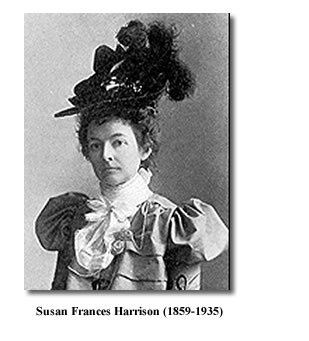SUSAN FRANCES HARRISON (1859-1935)
by Natalie King
Though little-known today, Susan Frances Harrison was an influential figure in Canadian cultural life from the 1880s until her death in 1935. Born in Toronto in 1859, and educated in Toronto and Montreal, Harrison’s first love was music. An accomplished pianist and composer, at the age of twenty she married John Harrison, a professional musician and choirmaster from Britain. Together, they invigorated the musical life of the City of Ottawa, where they lived for seven years.
When the couple moved to Toronto in 1887, Harrison continued to be active in musical circles, working as music critic for The Week, and serving for twenty years as the principal of the Rosedale branch of the Toronto Conservatory of Music.
In addition to her work as a musician, Harrison had been publishing poetry, fiction, and journalism since the age of sixteen, and used several different pseudonyms before settling on Seranus as her usual pen name, derived from a misreading of her signature, S. Frances. Harrison’s musical aptitude is discernible in her poetry; she was adept in her handling of the rhythmic complexities of poetic forms such as the sonnet and the villanelle. Like other Canadian poets of the late nineteenth century, her prevailing themes include nature, love, and patriotism. Her landscape poetry, richly influenced by the works of Charles G.D. Roberts and Archibald Lampman, paints the Canadian wilderness as beguilingly beautiful yet at the same time mysterious and distant: "The Islands appear and as longing for land they have found us / And the beauty of their birch and their selvedge of shadow hath bound us" ("The Thousand Islands"). Her poems were collected and published in the volume Pine, Rose, and Fleur de Lis in 1891, as well as in later chapbooks. Some of Harrison’s best prose can be found in Crowded Out! And Other Sketches (1886), a book of ten short tales and one novella. Written mostly in the voices of male narrators, these stories range widely from European settings to the Canadian Northwest.
Harrison’s two novels, The Forest of Bourg-Marie (1898) and Ringfield (1914) articulate a fascination with a heavily mythologized Quebec culture that Harrison shared with many English-speaking Canadians of her time. Harrison’s version of French Canada is characterized by a gothic emphasis on horror, madness, aristocratic seigneurial manor houses, and a decadent Catholicism, and forms a stark contrast with her sense of a “flat Ontario” dominated by Protestant materialism, yet haunted by the sense that it lacked a distinctive historical identity of its own. This romanticized vision made Harrison a popular interpreter of French Canada to Toronto audiences, delivering well-received lectures on aspects of Quebec folk culture.
Harrison was a staunch supporter of other Canadian women writers, especially Isabella Valancy Crawford. She continued to produce her own creative writing until her death, remaining committed to the same subjects and fixed poetic forms she had always favoured, despite the growing popularity of free verse. When public support for her writing began to weaken, she adapted by self-publishing. She died in Toronto. |

